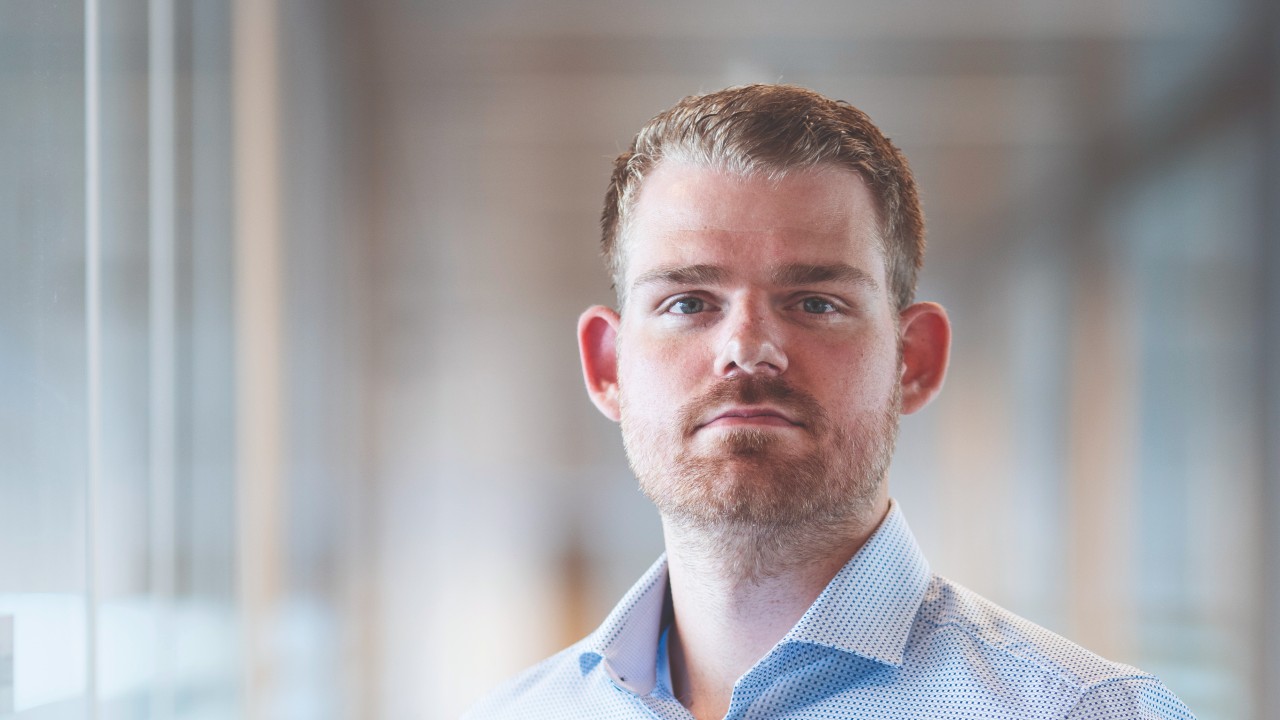With 12 years in the industry already, Gosselin’s Lennert de Jong is one of the sector’s most experienced young movers. In this interview, he speaks to FIDI Focus Editor Dominic Weaver about the people and events that have taught him how to make the best of his career to date
Lennert de Jong says there is an opportunity for personal growth in every encounter. Whether this means a conversation with a FIDI 39 Club peer or business partner, a chance discussion with a colleague at the bar at an industry conference, or a life experience shared, these are all chances to learn, be inspired and develop, says Gosselin’s Manager of European Services. As such, he says there are at least 100 people and events that have defined his 12-year moving industry career to date.
Even De Jong’s earliest experience – of growing up around the bustle of the Utrecht-based garden-shed manufacturing business that his parents founded – had a significant impact on his early career choices. With his mother doing the accounting and managing the office, and his father running a 40-strong sales department, company and family life were tightly intertwined. While De Jong enjoyed the manual jobs he did as a teenager for his parents, the always-on nature of their roles proved decisive for him.
‘Their job was not 9 to 5; it was all day, every day, including weekends,’ he says. ‘It was very clear to me that I didn’t want to work in a family business.’ However, he adds that the experience has also, ironically, made him highly committed (‘maybe too much’ at times) to putting in maximum effort for his employers.
Close family friend Marcel Boer also worked at his parents’ firm before joining the moving business and became a further influence on De Jong’s career. ‘Marcel saw me grow up from birth,’ he says. ‘When I was 18, and about to finish high school, he was working for De Haan, and he called me and said the company was looking for a move coordinator.’
A knee injury had recently forced De Jong away from hands-on work into the back office of the concert scaffolding department, where he was working part- time – and the variety offered by a switch to moving appealed from the start. ‘The international part, working with people and logistics, triggered my interest immediately,’ he says.

He began this work with ‘no clue’ about the challenges that define moving and relocation, but quickly grew to appreciate the blend of ‘hard’ and ‘soft’ skills required by the business.
‘Moving is such a weird mix,’ he says. ‘On the one hand, it is a tough industry, with logistics, containers, road, sea and air freight; but there is also a soft side that requires empathy and delicacy – in packing personal items, for example. That mix is so unique that I would probably never switch to a logistics company – because it removes the emotional part – or move to a full customer service-driven organisation, either.’
De Jong says it’s moving from role to role – rather than through the ranks – that really satisfies him. Different experiences at De Haan across imports, exports, client management, pricing, surveys, and customer services have given him a broad perspective and boosted his problem-solving capabilities overall.
While at De Haan, De Jong discovered a passion for bringing people into the company and using his own experience to develop their capabilities. ‘I get a lot of energy from seeing somebody grow,’ he says. ‘When you have a new hire who comes in and you see that fire start as we expose them to new things and explain the importance of building relationships with people, for example.’
De Jong’s career development meant uncovering key personal challenges, too. This included addressing his ‘emotional attachment to the work environment’, which could see him obsessing over problems and affecting his enjoyment of work and life for quite some time. ‘The sustainability of a company is built on its employees and, therefore, mental health is an important topic to be aware of,’ he says. ‘It’s a leader’s responsibility to ensure that their employees can thrive. I hope that openly talking about my journey will start a conversation, as even though we might feel alone with our feelings, we are actually not.’
He says tackling this meant flipping the problem on its head, focusing on the positives to arise with every challenge, rather than continually identifying what was going wrong. ‘I’ve learnt that moaning doesn’t help, and I now celebrate the small victories,’ he says. ‘And I try to share these and any positive news.’
In 2019, De Jong had an open discussion with Marcel Jörg, CEO of Gosselin Moving, who was asking if he was ready for his ‘next adventure’. This led him to join the company, with a brief to help align its services across Europe.
His mentor, Marcel Boer, took the Benelux Sales Manager position at the company later the same year, before his untimely death just four months into his new role. De Jong says this loss has driven him to make more of his time, both at work and at home. This was compounded by the arrival of James, his son, earlier this year.
Being on the management team of a larger organisation such as Gosselin turbo-charged the growth opportunities in De Jong’s career. ‘Instantly, I have five peers I can talk to every day as a team, giving feedback without sugar-coating things. It is refreshing, and we learn from each other daily,’ he says.
It also gave him wider experience – from managing services across Europe, writing bigger proposals, streamlining the pitch process, and presenting to large international clients. ‘Those things are a really big influence on your growth,’ he says. ‘Standing in the lobby of a big potential customer and being so scared – and then walking out and initially securing a win – is an experience you can never learn in school.’
De Jong says Gosselin has given him the freedom to innovate and explore new solutions to boost efficiency and sustainability in its supply chain. This includes combining European swap body containers with multimodal shipping – a project he says ‘is creating great synergies with partners… and saves a heck of a lot of money, increases driver capacity and reduces our carbon footprint’.
Much closer collaboration with clients as well as industry peers, he adds, will be essential for the industry to cleverly take on the environmental and logistical challenges of the future, including how to carry out ‘last mile’ deliveries most effectively.
‘To tackle dense city logistics, we might be required to team up as moving companies and solve these issues together,’ De Jong says. ‘If we have a hub on the edge of a city, we can combine smaller loads into white-label trucks to make it more efficient.’
Delivering a move for another company, overseas for example, is collaboration, he says, ‘but sharing capacity and dealing with these issues together represents real partnership.’
International mobility industry leaders, including FIDI, can be instrumental in highlighting opportunities for collaborative solutions such as groupage, knowledge sharing, and data standardisation. Strong relationships fostered by participation in international bodies, and at events such as industry conferences, will also play an important role, he says.
De Jong sees a ‘cultural or generational’ trend for younger employees to consider three or four years a maximum before looking to move on as a challenge movers will have to address for the future. ‘As a business we need to adapt to that,’ he says, suggesting that companies think more radically about attracting and retaining candidates.
‘Perhaps offering a more diverse portfolio, where people don’t stick to one role and they can explore other departments, or have side jobs and responsibilities, and can grow horizontally or rotate positions.’ A work- exchange scheme where staff swap with businesses in other countries could also work well, he adds.
Institutions such as the FIDI Academy can play a part in this process by exposing people to international travel and people, says De Jong, whose own love for the industry was confirmed with the lifelong friendships he made by taking part in the EiM course in Washington, DC nine years ago. However, telephone, social media, and online events, such as the FIDI 39 Club’s recent virtual meet up, can also help people communicate with their peers in the industry and form powerful global bonds based on shared interests. ‘All it requires is genuine interest and real connections can bloom.’
Forward-thinking firms need to provide employees – particularly younger ones – with a role that is wider than ‘doing the job and making money’, says De Jong. ‘Movers have an impact on society: we move people’s lives. We should be vocal about what our purpose is – creating smooth A to B moves for talent across the world, but also reducing CO2 emissions or helping people experience different cultures.’ Helping struggling colleagues perform moves across Europe in recent months is one of the elements that has given extra meaning to his own role, he says.
De Jong believes businesses must ensure they are technologically equipped for the future to attract the right calibre of staff. This means more than just digital inventories; it means seriously considering a spectrum of new ways of solving mobility challenges, from apps to AI. While ‘younger’ employees may naturally be faster adopters of new technologies, this isn’t universal, he says: the search for efficiency is a mindset – and can be found in employees of all ages.
De Jong says generalisations about staff age can be correct: younger people are more focused on sustainability, diversity and ensuring they have meaningful work, for example, while older people are commonly better at using the phone instead of emails to get fast results and build relationships, and taking a longer-term view of their careers rather than switching to get a larger salary at the earliest opportunity. However, he says firms need to take a holistic approach to recruiting and celebrate individuals rather than make assumptions based on age.
De Jong is currently enjoying growth in his own career and says his ultimate aim for each project – whether innovating or building a team – is to make himself redundant. ‘I shouldn’t be the cornerstone of any team or project – I want them to thrive by themselves,’ he says.
Taking responsibility for your own fulfilment at work is essential, he adds, taking control of those elements of your surroundings you can and accepting those you cannot. If this doesn’t work, he says: ‘You can do two things. You can change that environment, or you can move to a new one.’
Alongside this, he advises anyone in the business to ensure that they make the most of the opportunities available to them.
‘Your time and energy are precious, so live in the moment and think “am I making the best of it?”,’ he says. ‘Try to surround yourself with people you can learn from, and remember that, even though your title might not say chief officer or vice president of whatever, there is so much impact you can have on your world.’

